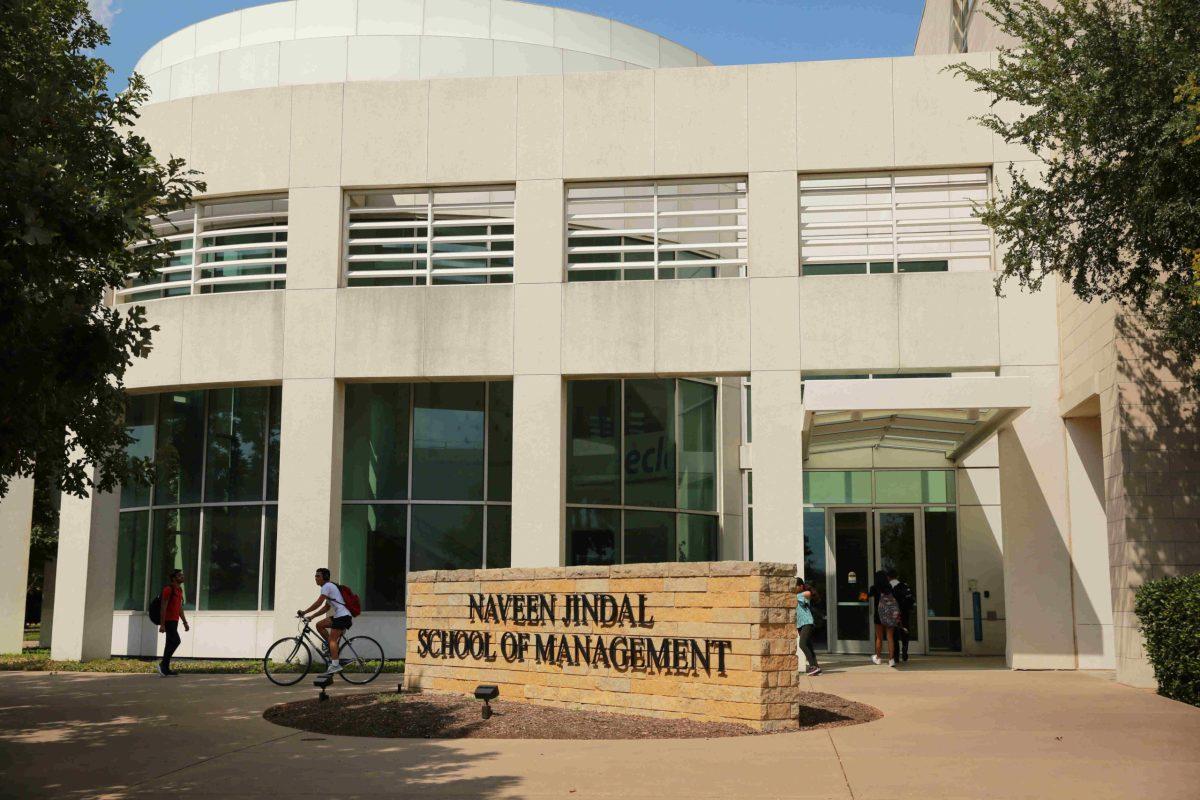Naveen Jindal School of Management is officially ranked No. 10 in public business schools in the U.S. and No. 27 business schools overall, according to a new ranking from U.S News and World Report; a six-place jump from a ranking of No. 33 in Sept. 2021.
Dean of JSOM Hasan Pirkul credits the rating jump to JSOM’s full-time MBA program, which offers a comprehensive understanding of fundamental aspects of business management, including leadership and organizational behavior, before entering post-graduate life. The increased ranking comes as UTD now reaches T50 public school status – according to U.S. News and World Report, UTD is ranked No. 58 in public schools this year, compared to a No. 72 ranking in October 2022.
Of UTD’s seven schools, JSOM has the most students enrolled, with 10,412 students in 2022, accounting for 25% of all undergraduates and 49% of graduates. JSOM also ranked No. 2 worldwide in business-related research contributions from the years 2018–2022. Research projects through Jindal professors include improving fraud identification technology, the impact of racial diversity on retail store success and the effect of fraud on investor behavior.
Pirkul has directed the school for 27 years. He received a bachelor’s degree in industrial engineering from Bogazici University in Istanbul, Turkey and graduated from the University of Rochester’s Simon School with a master’s degree in management science and a Ph.D. in computer information systems. Pirkul said UTD’s ranking can be attributed to his efforts with his colleagues, including creating unique internship opportunities and pursuing international recognition. Under Pirkul’s tenure, JSOM has hired world-class faculty, like associate professor Skuza Agnieszka, a business growth coach from Poland with extensive research in talent management, as well as Business Analytics Director Prajakti Akarte, who has interest in finance, geopolitics and data science.
“I came with the goal of building [a] nationally and internationally ranked visible high quality business school and I think if you have that commitment … good things happen,” Pirkul said.
JSOM offers students seven degrees available to both undergraduate and graduate students: business administration, finance, global business, healthcare management, human resource management, marketing and supply chain management. This contrasts with other business schools such as University of Texas at Austin and Texas Tech, which typically offer two: business administration and executive or STEM and professional business administration. Pirkul said that after JSOM’s rapid growth he realized faculty could not serve students well enough due to their numbers, leading to the split of business administration and accounting into seven individual degrees.
“I can [also] have faculty and staff focused on each one of these degrees. So that’s why our students are, in my opinion, very well served,” Pirkul said.
In UTD as a whole, information technology ranks as the fifth most popular major for graduate students. According to the class profile for the full-time MBA program in JSOM, the top three undergraduate majors are business, engineering, and social sciences. Business analytics sophomore Sejal Goyal, who is also the treasurer for Business Professionals of America, said that she thinks differently.
“In my opinion, I think [the top three] would be either ITS, finance or business analytics. [It is] mainly recognized, and it’s well regarded and has a high reputation for it as well,” Goyal said.
Pirkul said that hiring outstanding faculty and staff was a reason for the school’s success. He said the most important quality he looks for in new hires is their commitment. Regardless of their talent, they must have the ability to help their students and raise them as successful business professionals.
“I tell them, you have to take care of my students. If you don’t, then we have a problem … We do not tolerate a faculty member who doesn’t care [about their students],” Pirkul said.
International management studies graduate Matthew Fitzgerald, who is also the president of Global Business Organization, said that JSOM maintains its high standards in part through good professional development opportunities. The JSOM Career Management center can direct students toward a specialist to help them find internships and learn fundamental business skills. For example, a way to obtain professional development skills is case studies, business scenarios students walk through with professors to see how they might approach a similar situation in their career.
“I think definitely having that high standard to look forward to has helped JSOM improve over time a lot as well,” Fitzgerald said.
Both Fitzgerald and Goyal said they would like to see more availability, as classes are not offered every semester, and it can be difficult to match with career fair opportunities in a timely manner. Vice Dean of JSOM Varghese Jacob also said the school would like more class availability as well as more opportunities for economically disadvantaged students. One such resource includes the Jindal Young Scholars Program, which connects Dallas ISD graduates to scholarships at UTD.
“We want to expand that program so that we have students who are economically disadvantaged, have the same ability to access and go to college, like somebody who is living in a more affluent neighborhood who has more access to resources,” Jacob said.
Fitzgerald said JSOM has the most international students enrolled thanks to the strong reputation of JSOM’s full-time MBA program. According to the program’s class profile, 39% of students are international, while 61% are domestic. Additionally, organizations such as the Global Business Organization and Business Professionals of America at UTD help locals, students and alumni network.
“We want to make sure that you [guys] grow up as open-minded and citizens of the country and be ready to contribute to the society and to the companies that you go to work for,” Pirkul said.





